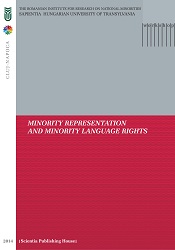Catalonia’s Experiences for the Carpathian Basin
Catalonia’s Experiences for the Carpathian Basin
Author(s): István Szilágyi
Subject(s): Politics / Political Sciences
Published by: Scientia Kiadó
Summary/Abstract: The 21st century is the age of globalization, the era of connections and occurrence between cultures and civilizations representing different values and value systems. Our century is also the time of minorities and the time of identities becoming nation-conscious again as well as the time of integrational, disintegrational, territorializational, deterritorializational and reterritorializational tendencies and the implementation of the principle of the subsidiarity. All these factors have a significant influence on the multinational state structures in both the development and semi-peripheral areas of the world. The cessation of the Soviet Union, Yugoslavia and Czechoslovakia, the federalizational and structural transformations in Great Britain, Spain and Italy and the state-failures in the area of the third world are the manifestations of the same phenomena. In the first part of the study, we follow the developing and changing processes of the democratic Spanish autonomy system. Preferably, we focus on the new Autonomy Statute of Catalonia, passed in July 2006. The document considers the Catalonians an independent nation; the official language of the self-governing community is the Catalonian language. The separation of Catalonia from Spain, becoming an independent state and uniting the territories of the historical ‘Great Catalonia,’ arises as a real alternative. In the second part of the study, we analyse the applicability and validity of the Catalonian model in the Carpathian Basin. In this framework, first we summarize the different autonomy formations and solutions, and then we examine the conditions of their application. We survey the migration, assimilation processes, the data of the national census and their historical backgrounds in the Carpathian Basin inhabited by Hungarians in the last ninety years. On the ground of these facts, we analyse the applicability of the Catalonian experiences, their analogies and differences. Finally, we lay down the followings: the Spanish-Catalan solution involving the notion of the concept of the cultural nation may bring official attention to the issue of the validity and feasibility of this model in the case of the minorities in the multinational states of our region. The reality of political self-government, territorial autonomy, the preservation of identity and its connection to the official use of language as well as the creation and maintenance of the necessary institutional framework calls attention to the practicability of a democratic state formation practice already existing in the European Union.
Book: MINORITY REPRESENTATION AND MINORITY LANGUAGE RIGHTS
- Page Range: 191-214
- Page Count: 24
- Publication Year: 2014
- Language: English
- Content File-PDF

